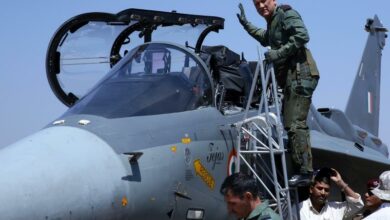Ecuador’s indigenous leader held after widespread anti-government protests

Quito, June 14 (EFE).- Police have arrested a prominent leader of an Ecuadorian indigenous group in a crackdown against protesters to demand better economic conditions and improved public safety in the South American country.
Leonidas Iza, president of the Confederation of Indigenous Nationalities of Ecuador (Conaie), one of the protest organizers, was arrested shortly after midnight on Monday, the group said.
The arrest came after President Guillermo Lasso said the government had begun cracking down on those involved in vandalism during the nationwide protests by Conaie.
Lasso warned on Sunday that the government would not allow protesters to take roads or oil installations amid growing outrage over rising fuel prices in the latest exhibition of public fury over inflation and unemployment in the oil-producing country.
Conaie Tuesday denounced the arrest of the leader of the largest group of indigenous peoples.
The group shared videos on social networks, showing police officers forcing Iza into a vehicle near the Pastocalle town in the Cotopaxi province.
Without naming Iza, Lasso announced later that the arrest of the masterminds and authors of the “violent acts has begun.”
“It is up to the prosecutor’s office and the judiciary to act because no one is above the law. We Ecuadorians cannot be victims of vandals who only want to cause chaos,” said Lasso.
The first day of the indefinite protest began Monday with roadblocks in some Ecuadorian provinces.
The Integrated Security Service (ECU 911) reported road closures in the Andean provinces of Pichincha (whose capital is Quito), Tungurahua, Cotopaxi, and Chimborazo, and in the Amazonian region of Pastaza.
Iza said the group called the demonstrations after three failed attempts at dialog with the government last year – on June 11, Oct. 4, and Nov. 20.
Lasso said in his message that now that the pandemic was under control and the economy returning to normalcy, “political groups looking to destabilize and further agitate the situation cannot be allowed to paralyze the country once again.”
The demonstrators are demanding lower fuel prices and economic relief, including a moratorium on debt payments for at least a year and a reduction in interest rates.
The protesters also want more government spending on health care and education and on public safety measures to halt a wave of organized crime, drug trafficking, and kidnappings.
The protests, which do not involve the public transport sector, are being held when a state of emergency is in place in three coastal provinces of Guayas, Esmeraldas, and Manabi, racked by high levels of drug trafficking-linked violent crime.
The government said the blockades were ineffective and did not paralyze the country.
The government alleged the protesters coerced agricultural producers to join them and set a police vehicle on fire in San Pedro de Yumate.
An indigenous community of the Kichwa ethnic group in Amazon took over the facilities of an oil pumping unit operated by the Petrolia company, which had to be disconnected due to pressure from the natives.
“My obligation as president is to guarantee Ecuadorian families the possibility of moving freely, their right to study, work, and produce. Now that we have begun to reactivate ourselves, we cannot stop,” Lasso said in his message.
Conaie-led protest against then-president Lenin Moreno in late 2019 effectively brought the country to a standstill between Oct. 3 and Oct. 13.





